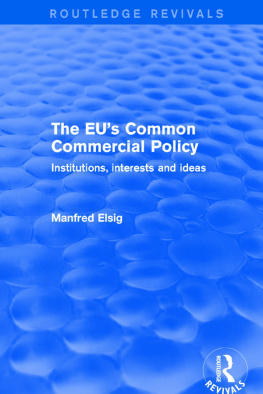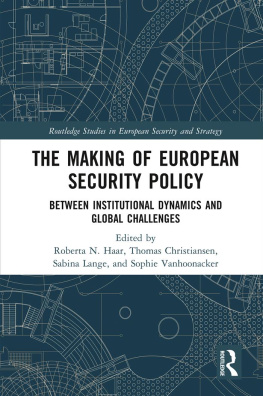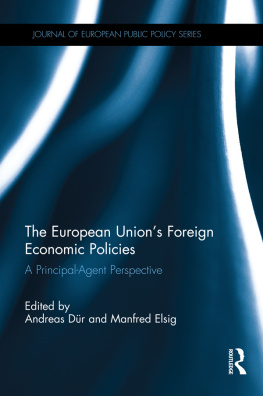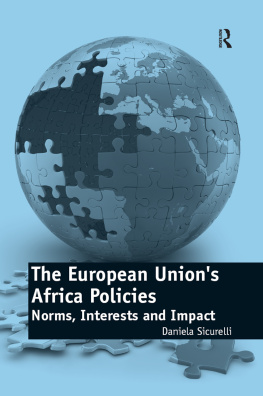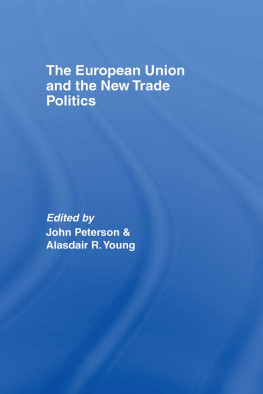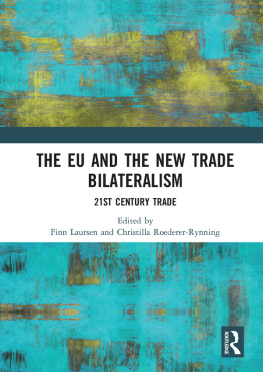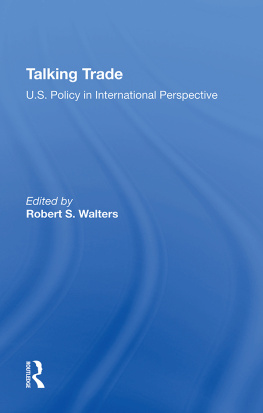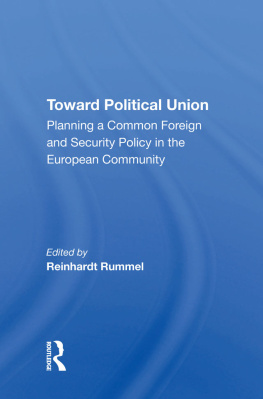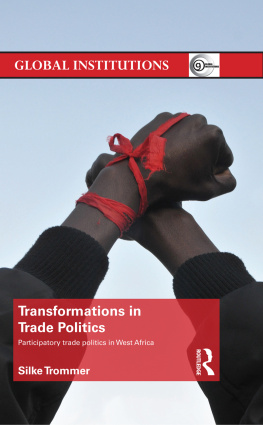THE EUS COMMON COMMERCIAL POLICY
To Kathleen
The EUs Common
Commercial Policy
Institutions, interests and ideas
MANFRED ELSIG
University of Zurich
First published 2002 by Ashgate Publishing
Reissued 2018 by Routledge
2 Park Square, Milton Park, Abingdon, Oxon OX14 4RN
711 Third Avenue, New York, NY 10017, USA
Routledge is an imprint of the Taylor & Francis Group, an informa business
Copyright Manfred Elsig 2002
The Author has asserted his right under the Copyright, Designs and Patents Act, 1988, to be identified as the Author of this Work.
All rights reserved. No part of this book may be reprinted or reproduced or utilised in any form or by any electronic, mechanical, or other means, now known or hereafter invented, including photocopying and recording, or in any information storage or retrieval system, without permission in writing from the publishers.
Notice:
Product or corporate names may be trademarks or registered trademarks, and are used only for identification and explanation without intent to infringe.
Publishers Note
The publisher has gone to great lengths to ensure the quality of this reprint but points out that some imperfections in the original copies may be apparent.
Disclaimer
The publisher has made every effort to trace copyright holders and welcomes correspondence from those they have been unable to contact.
A Library of Congress record exists under LC control number: 2002074548
ISBN 13: 978-1-138-71920-0 (hbk)
ISBN 13: 978-1-315-19548-3 (ebk)
Contents
When I began my research project on EU foreign trade policy in 1999, I had a vague idea of the challenges awaiting me. However, I did not expect to encounter such a multitude of interesting facets in a prime facie technocratically dominated policy field. In the years prior to returning to academia, my first visits to the Commission and EFTA headquarters in Brussels was as a young trade diplomat. These were fascinating experiences which sparked a desire to spend more time uncovering the mechanisms and patterns behind this pleasant but chaotic and rather opaque environment. At the time, I did not anticipate that these nagging interests would send me back to University to spend three years seeking answers to my many questions.
This book, which flows out of a PhD project at the University of Zurich, attempts to offer to a broader audience an institutional perspective on the EUs Common Commercial Policy. This is accomplished by providing a framework for analysis, which bundles together approaches from neighbouring disciplines and aims to highlight the paths interests and ideas take in the current EU policy-making environment. The case-studies guide the reader through the current mechanisms in place at the EU level and offer an overview of the challenges the EU is awaiting in light of enlargement.
Numerous people have supported me in my endeavour to whom I would like to express my gratitude. First of all, thanks goes to my family and friends for understanding my physical disappearance for many months, their caring words and their constant encouragement.
Special thanks goes to my interview partners at the European Council, the European Commission, the European Parliament, participants of Art. 133 Committee meetings and members of Brussels-based think tanks and consultancy offices. I very much appreciated the time they took to answer my numerous questions, be it by way of telephone, in their offices, surrounded by piles of EU documents, or in a fancy Hotel bar, where the local beer helped liven the interview. A particular thanks goes to Frans Andriessen, Hans-Friedrich Beseler, Lord Leon Brittan, Kerstin Bollmann, John Clarke, Nicholas Clegg, Andr Donnadou, Karl Falkenberg, Jorge Nuez Ferrer, Robert Madelin, Rolf Mhler, Joo Pacheco, Allan Rosas, Okka-Pekka Salmimies, Rupert Schlegelmilch, Murray Smith, Tom Smith and Carlo Trojan for their time and openness.
Further, I gratefully acknowledge the support of Dieter Ruloff and my colleague at the institute, Sandra Lavenex, who provided an open ear for my periodical doubts on research questions, methodology and the scientific surplus value of my writing.
For comments on earlier drafts and individual sections of the book, I would like to thank Simon Hug and Jrg Monar. Many thanks is also due to the participants in the ECPR Summer school on EUs External Capability and Influence in International Relations, Geneva, August 2000; and in the Summer school of the ECPR Standing Group on Analytical Politics and Public Choice in Konstanz, September 2000.
Other debts incurred are to Mary B. Walsh, an Irish expatriate, for offering her living room during my stay in Brussels and for valuable information on the Brussels network. Moreover, special thanks goes to Franck Amalrik, Dearbhalla Balfe, Christa Brunnschweiler, Michael Flad and Markus Stierli for editorial assistance.
My greatest debt of gratitude goes to my wife Kathleen Elsig, who spent days and nights engaged in proof reading and patiently put up with me during a particularly stressful and challenging time of my life.
M. Elsig, Konstanz, May 2002
ACP Arican, Caribbean and Pacific countries
AoA Agreement on Agriculture
APEC Asia-Pacific Economic Cooperation
BSE bovine spongiform encephalitis
BverfG Bundesverfassungsgericht
CAP Common Agricultural Policy
CBI Confederation of the British Industry
CCP Common Commercial Policy
CDU Christian Democratic Union
CEEC Central and Eastern European Countries
CFSP Common Foreign and Security Policy
COREPER Committee of Permanent Representatives
CSU Christian Social Union
DG Directorate General
DGB Deutscher Gewerkschaftsbund
DSU Dispute Settlement Understanding
EC European Community
ECJ European Court of Justice
ECPR European Consortium for Political Research
ECSA European Community Studies Association
ECSC European Coal and Steel Community
EEC European Economic Community
EFTA European Free Trade Area
EMU Economic and Monetary Union
EP European Parliament
EPC European Political Co-operation
EPU European Political Union
EU European Union
EURATOM European Atomic Energy Community
FAO Food and Agricultural Organization
FDI foreign direct investment
FSAP Financial Services Action Plan
FSC Foreign Sales Corporations
FT Financial Times
FTA Free Trade Area
FTAA Free Trade Agreement of the Americas
GAC General Affairs Council
GATS General Agreement on Trade in Services
GATT General Agreement of Tariffs and Trade
GDP gross domestic product
GMO genetically modified organism
IGC Intergovernmental Conference
IGO Intergovernmental Organization
IHT International Herald Tribune
ILO International Labor Union
IMF International Monetary Fund
IP Intellectual Property
IPE International Political Economy
IR international relations
ISPA Instrument for Structural Policies for Pre-Accession
JHA Justice and Home Affairs
LDC Least Developed Countries

